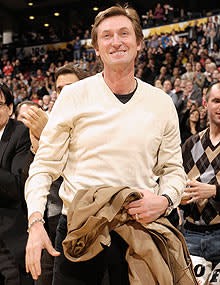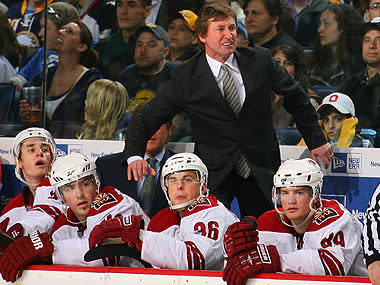Gretzky & the Leafs: Perfect union or problematic?
Wayne Gretzky. The Great One. If I were putting together an NHL ownership group under just about any circumstances, he would be among the first people I would approach. That would be especially true if I were leading an American investment group looking into the Toronto Maple Leafs, who declare themselves Canada's team with a flag-waving, musical montage before every home game.
It doesn't matter that his involvement with the Phoenix Coyotes ended so badly. It doesn’t matter that he has become an American himself. It doesn’t matter that he never wore the blue and white. The Gretzky brand remains as strong as it has ever been. He wouldn't have to play an active role. He wouldn't even have to put up much money, if any. In exchange for a stake or a salary, he could be the face – or just a face – of the organization. His legend of greatness, image of class and Canadian heritage would be invaluable.
No wonder Gretzky has been approached about several opportunities since parting with the Coyotes, including ownership involvement with two of his former teams – the Los Angeles Kings and Edmonton Oilers – according to TSN. No wonder he has been approached by multiple groups interested in purchasing a majority stake in Maple Leaf Sports and Entertainment – including the American firm Providence Equity Partners – according to Sportsnet. Who wouldn't want him?
But what does Gretzky want? And what does MLSE really need?
Just because Gretzky has been approached doesn't mean he will become involved. His agent, Darren Blake, released a statement Thursday night that said: "Wayne is often approached about becoming involved in various hockey opportunities. At this point in time, there is nothing happening involving the purchase of the Toronto Maple Leafs." And although I have been unable to reach Gretzky, I interviewed him in January before he was about to turn 50. (If you have any doubt about Gretzky's gravitas, just look back at the hubbub about his birthday.)
Gretzky said he was enjoying life, living north of Los Angeles, spending summers in Idaho, watching his five kids play sports like baseball and lacrosse, following hockey as a fan without the stresses of playing or coaching or managing or owning.
He said his Phoenix experience didn't sour him on the NHL whatsoever, just that "unfortunately sometimes the business side of things can sort of jump off the rails." But remember he was the managing partner and head coach of the Coyotes, and his departure was messy – a 143-161-24 coaching record and no playoff appearances, a bankruptcy and relocation attempt, millions of dollars in dispute. Millions of dollars remain in dispute.
A guy like Gretzky is not used to failure, to losing, to having his golden name tarnished in any way. You have to wonder if he would want to risk going through any of that again. I asked him if he was finished. He left the door open about returning to the game, saying, "Never's a long time." Blake left no doubt, saying, "Something's going to get his interest down the road here." But both made it clear that nothing was imminent.
"Listen, it’s a great game," Gretzky said. "I love it. People know me. It’s been my life. Right now, it’s not something that I think about. ‘OK, who am I going to work for tomorrow? What am I going to do tomorrow?’ That doesn’t sort of enter into the equation."
Gretzky could be a great part of the equation for MLSE. But what would get his interest? Would he want to be a minority partner, a figurehead, a glorified PR man, showing up at an introductory press conference and reminiscing about growing up in Brantford, Ontario, and watching hockey at Maple Leaf Gardens? Would that be too little, and would he want to be the face of something of which he doesn't have full control? Or would he want a challenge, moving from California to Ontario and taking an active role in hockey or business operations? Would that be too much? There are pros and cons to both, on both sides.
If I were a faceless American group like Providence Equity Partners, I would want Gretzky as the glorified PR man. His legend alone would connect ownership to the fans, even if he kept living in California. Whether I would want him as managing partner or in a hockey-related role would have little to do with his legend, though. It would be based on if I thought he was the best man for the job and he was committed to it.
The best way – at least a fan's favorite way – to run a professional sports franchise is with a singular, committed owner who finds the bottom line in the standings and not on his balance sheet. Think Mike Ilitch. Think Terry Pegula. Winning is personal to them, and they might take risks and accept some losses that an investment manager wouldn't. All owners want to make money in the end, but some want to win along the way more than others.
I don't know if the Leafs will ever have an owner like that. I don't know if they can. They're part of MLSE, which also owns the NBA's Toronto Raptors, MLS' Toronto FC and the AHL's Toronto Marlies. MLSE owns Air Canada Centre and is invested in four other sports facilities. It owns three TV channels and Maple Leaf Square, a multi-use real-estate development. The Ontario Teachers' Pension Plan is looking to sell its 79-percent stake, and that is worth something like $1.5 billion to $1.8 billion.
When you're talking billions, you're dramatically reducing the number of individuals with that kind of money, leaving you with groups of investors. And don't even think about the Leafs being sold off separately as some rich man's toy. MLSE needs the Leafs as its foundation – it is Maple Leaf Sports and Entertainment – and the Leafs are most valuable when they can be leveraged in other ways – from merchandising to media content.
That doesn't mean the Leafs can't win. No matter how ownership is structured, the key is hiring the right hockey people and then giving them the time and resources to do their job. This structure has hampered the Leafs in the past – emphasizing making the playoffs each year to reap short-term revenue, instead of sticking a long-term plan. But ironically, with the Leafs mired in a six-season playoff drought, the structure isn't the problem now.
The Leafs have to stay within the salary cap like everyone else, but that's for players. They can spend as much as they want for executives. General manager Brian Burke is midway through a six-year, $17 million contract, and he's a Stanley Cup winner with an all-star cast of advisors – Dave Nonis, Dave Poulin, Claude Loiselle, Rick Dudley, Cliff Fletcher. They have more GMs than General Motors, and while some of Burke's early moves smacked of impatience and reflected a rebuild-on-the-fly philosophy, most of his later moves have been oriented toward the future. This is a flawed team, but a young team with some up-and-coming talent.
We’ll see whether these are the right hockey people and whether they did their job well. But it will hard to argue they haven't had the time or the resources.
Gretzky? The Great One? He doesn’t necessarily want the Leafs; the Leafs don't necessarily need him, either. But it never hurts to explore to see if there's a fit – in a PR role or a hockey role. As Gretzky once said, you miss all of the shots you don't take.


